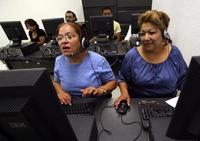Minimum-wage proposal; Better jobs in El Paso would help beat poverty
April 22, 2007
With unemployment rates higher than state and national averages and a work force that is often underemployed, El Paso faces the challenge of securing niche markets and creating higher-paying jobs to combat poverty, area educators and city officials say.
Written by Zahira Torres, El Paso Times

Luz Armida Hernandez, left, and Graciela Machado worked an English-language interactive program in their language class Thursday at the Ysleta Community Learning Center. Learning English might help them get higher-paying jobs. (Rudy Gutierrez / El Paso Times)
With unemployment rates higher than state and national averages and a work force that is often underemployed, El Paso faces the challenge of securing niche markets and creating higher-paying jobs to combat poverty, area educators and city officials say. "We've got people who would rather be underpaid and underemployed than leave here," UTEP professor and economist Tom Fullerton says. "It is somewhat of a reverse brain drain." While not the only factors that hurt the El Paso economy, low wages and lack of jobs have helped keep more than 200,000 El Pasoans below the poverty line, according to the 2005 American Community Survey of the U.S. Census Bureau. Until recently, Dawn Thurmond was one of those people. Thurmond, a UTEP graduate and mother of a child with disabilities, found it difficult to secure a good-paying job after returning to El Paso from Washington D.C. "I went to a few staffing agencies in search of a position, and it was disheartening because they told me I was overqualified," Thurmond said. "One agency asked me to create two separate resumes -- one that had everything I had done and one in which I was asked to underplay my accomplishments. "They told me I had to lie or else companies would think they could never afford me." City officials said they hoped to address unemployment and underemployment concerns through the planned medical school, the influx of soldiers and the diversification of jobs. The city's Regional Economic Development Corp., or REDCO, one of the entities created to encourage economic development and draw business investment to the area, contends that El Paso is set to benefit from various industries in the coming years. The organization sought national consultants to help identify three target industries: military, defense, homeland security; health-care and biomedical businesses; and automotive-related companies. Bob Cook, president of REDCO, said El Paso offers location advantages for military, defense and homeland security industries. "We're located on the U.S.-Mexico border, one of the largest international metro areas in the world, and it just provides a unique laboratory environment for homeland security companies to develop technologies that can enhance homeland or border security," Cook said. Health-care and biomedical industries are being targeted because officials feel that the demographics of El Paso will complement further development in military health and provide a key location for studying health concerns for a growing Hispanic population, Cook said. "We are 83 percent Hispanic," Cook said. "When you look at national growth demographics, the Hispanic demographic from now to midcentury, now to 2050, is predicted to grow at 188 percent." Another key effort of REDCO is to encourage more investment by the automotive industry in the El Paso, Juárez and Las Cruces area. "North American consumers buy over a third of the world's automotive production on an annual basis, and what is happening in that industry is that the final assembly manufacturing of automobiles is moving closer and closer to the consumer markets," Cook said. This article was published in Week 4 of the El Paso Times Poverty Series.
![]()
![]()
Related Stories
![]()
Fair Use Notice
This site contains copyrighted material the use of which has not always been specifically authorized by the copyright owner. We are making such material available in our efforts to advance understanding of environmental, political, human rights, economic, democracy, scientific, and social justice issues, etc. We believe this constitutes a "fair use" of any such copyrighted material as provided for in section 107 of the US Copyright Law. In accordance with Title 17 U.S.C. Section 107, the material on this site is distributed without profit to those who have expressed a prior interest in receiving the included information for research and educational purposes. For more information go to: http://www.law.cornell.edu/uscode/17/107.shtml. If you wish to use copyrighted material from this site for purposes of your own that go beyond "fair use", you must obtain permission from the copyright owner.